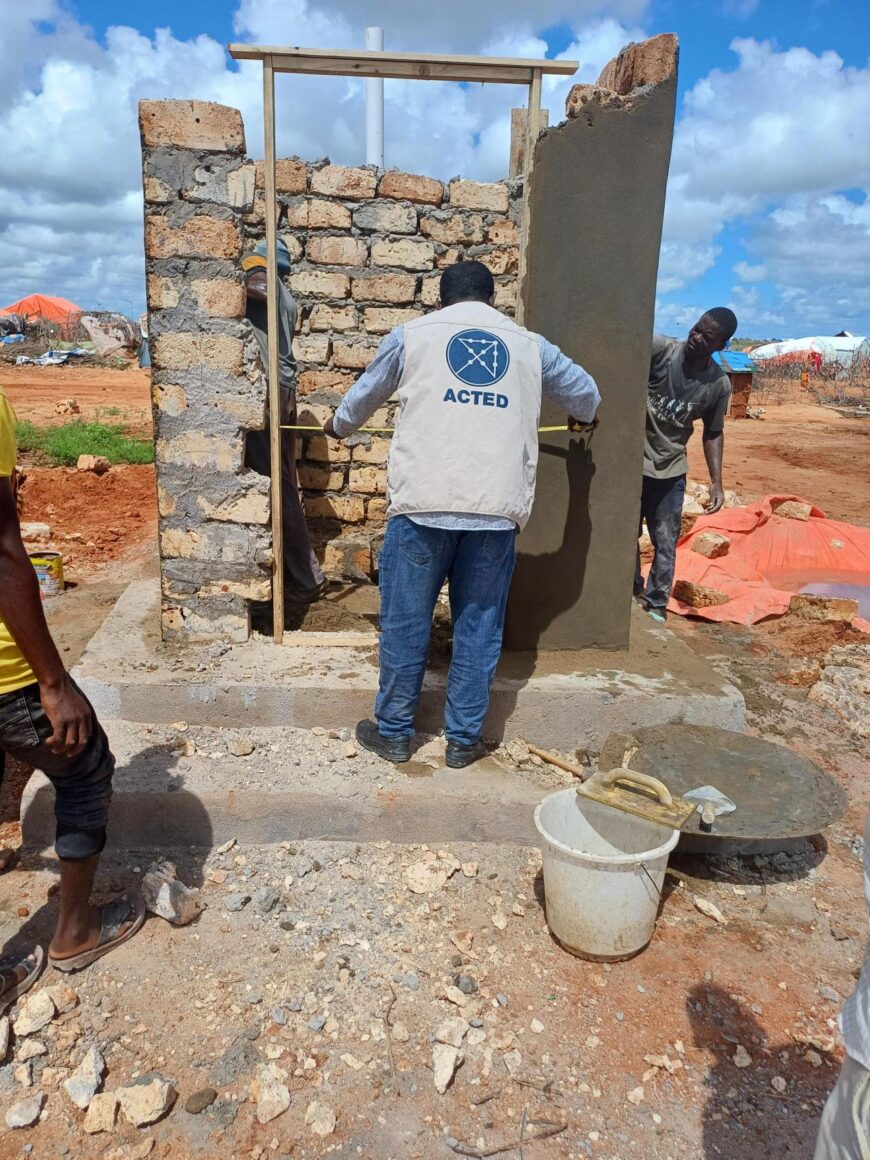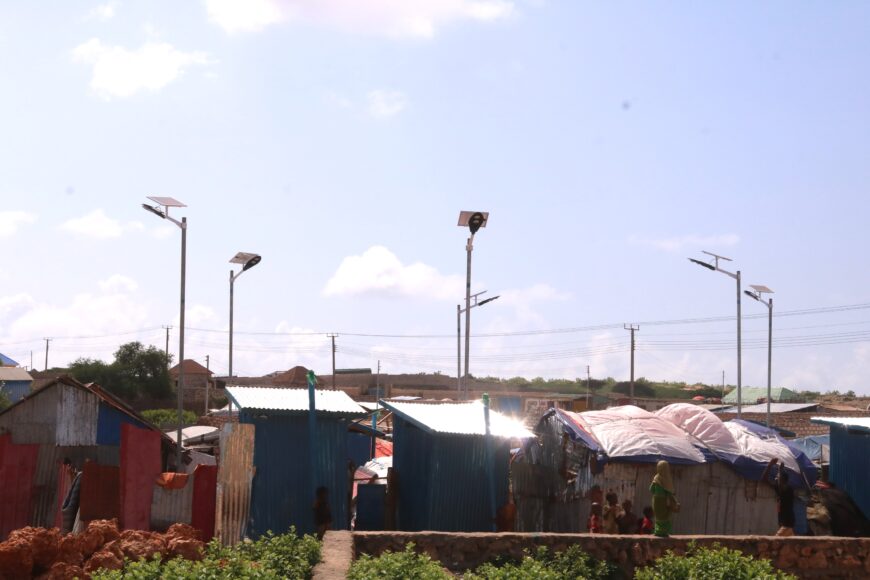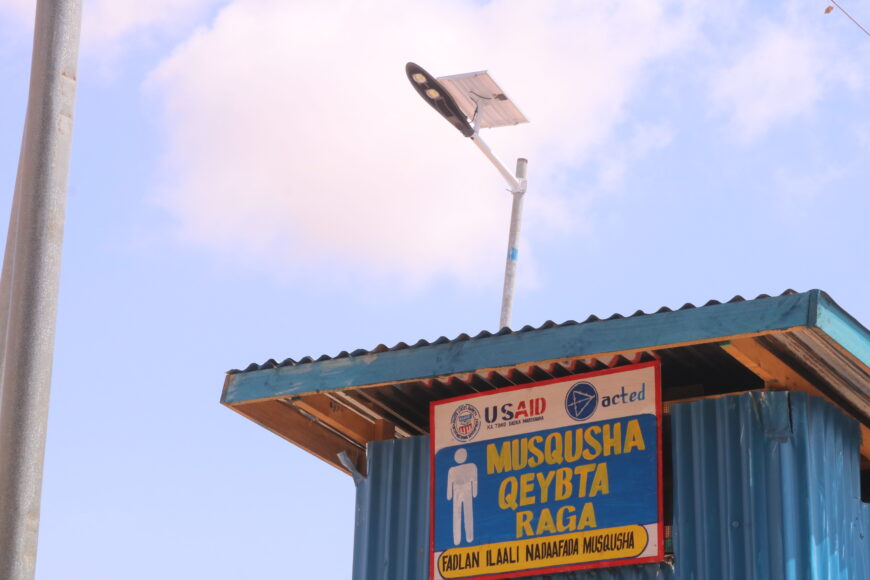The recent rains that hit Somalia in October and November 2023 have impacted Somalia heavily, causing flash and riverine flooding. These torrential rains destroyed roads, bridges, farmland, and basic infrastructures. In particular, water infrastructures, increasing the gap existing in access to safe water, hygiene supplies and sanitation services (OCHA). Unsafe water and poor sanitation can lead to the emergence of waterborne diseases within the affected communities.
According to the WASH Cluster in Somalia, 730 water points have been inundated and 8.5K latrines have been damaged.
Acted, in partnership with IMPACT Initiatives, Social-Life and Agricultural Development Organization (SADO), Gargaar Relief Development Organization (GREDO), and Marginalized Communities Advocacy Network (MCAN), has been conducting a BHA/USAID-funded project “Providing Dynamic, Targeted and Informed Assistance for Integrated Life-saving Support to Households Most Affected by Drought and Conflict in Somalia project” between May 2023 and April 2024. This 12 months project aims to provide targeted, dynamic and informed assistance for integrated life-saving support to 95000+ households affected by drought and conflict in Somalia, both to prevent and mitigate the impact of displacement, including in hard-to-reach areas through a set of activities under Humanitarian Coordination Information Management and Assessment (HCIMA) , Multipurpose-Cash Assistance (MPCA), Food Assistance (FA), and Water, Sanitation & Hygiene (WASH) sectors.
As part of its El Niño Response Plan, Acted has started to implement activities to anticipate and respond to the heavy rains and floods that have affected over 2.5 million people across Somalia, according to the Somalia Disaster Management Agency (SODMA). [1]
Indeed, a joint pre-flood assessment carried out on October 2023 by Acted and its partner SADO revealed that 76% of the 67 assessed IDP sites in Kismayo, Jubaland are at risk of flooding due to their low-lying locations near rivers. These sites were poorly equipped with sanitation facilities, threatening internally displaced people and host communities with waterborne diseases due to the El-Niño floods. [2]

WASH promotion as a key element for displaced communities in Jubaland
With the support of BHA/USAID, Acted, in partnership with SADO, is addressing the urgent sanitation needs of the flood-affected communities in Jubaland by providing lifesaving support. Through the construction of 370 gender disaggregated latrines, equipped with solar lighting and handwashing facilities, a vital step has been taken to mitigate the looming threat of waterborne diseases among displaced families. These latrines have been specifically built to resist floodwater, ensuring resilience against natural disasters. Almost 3000 households living in the IDP sites of four districts (Kismayo, Baardheere, Dhoobley and Luuq) in Jubaland are now equipped with safe and private spaces, which improved sanitation and hygiene among the displaced communities.

Hussein’s Story
Hussein Muktar* is a 45-year-old man living in Dulcade IDP camp in Kismayo. Hussein fled from rural areas after recurrent flood affected his family. He had to move to Kismayo and is now settled in Dulcade IDP camp. He lost his house, his livestock and his source of income and had no access to livelihoods.
On September 2023, Hussein arrived at Dulcade IDP camp, one of the IDP camps hosting displaced people in Kismayo. He faced a lack of proper sanitation facilities that forced him and his family to practice open defecation, which can cause serious health problems. Hussein was thus worried about the health of his family and the risk of waterborne disease outbreaks like cholera and acute watery diarrhea (AWD).
To mitigate the risk of waterborne diseases and anticipate El-Nino floods impact, Acted constructed flood-protected latrines in October 2023 in the IDP sites including the camp where Hussein lives. These latrines will have a lasting impact, as they are designed to withstand the shock of future floods without breaking and keep the communities safe and healthy during floods, and after the floods.
I will no longer worry about my family's health and dignity, as we have access to clean and separate toilets, and we feel more comfortable and secure now
Thanks to Acted and BHA/USAID support, Hussein and his family were able to meet urgent sanitation and hygiene needs. This construction of flood-proof latrines led by Acted enabled them to recover dignity and mitigate water waterborne disease outbreaks. Thousands of IDPs residents are in the same situation than Hussein and his family and have benefited from flood protected latrines. Thanks to the 12 months project funded by BHA/USAID, the risk of waterborne diseases was reduced and the dignity of the people living in these camps was restored.
Overflowing latrines during flood leads to serious health risk to communities: contaminated water may infiltrate surface or groundwater sources, and if population use the surface-water as source of water, it can bring to waterborne diseases. Also, normal latrines can easily be damaged by floods.
Flood protected latrines: include elevating latrines or lining latrine pits to reduce waste infiltration.

[1] https://reliefweb.int/report/somalia/somalia-situation-report-11-dec-2023
[2] https://reliefweb.int/report/somalia/pre-flood-assessment-report-kismayo-baardheere-luuq-and-jamame-districts-jubaland-somalia
* The name has been changed to protect the identity of the beneficiary.